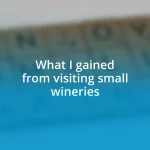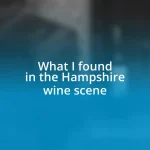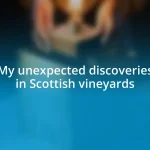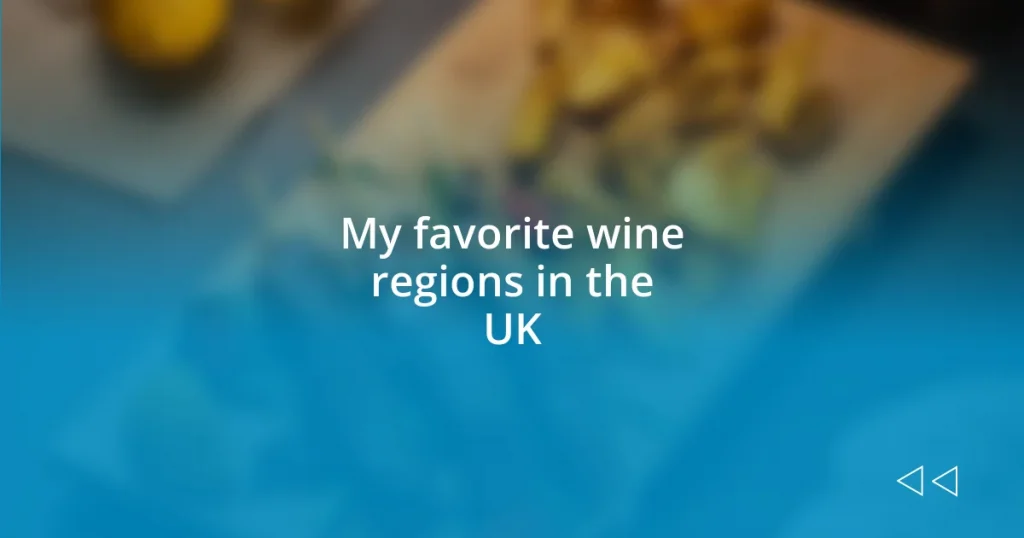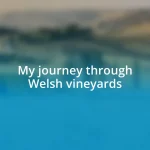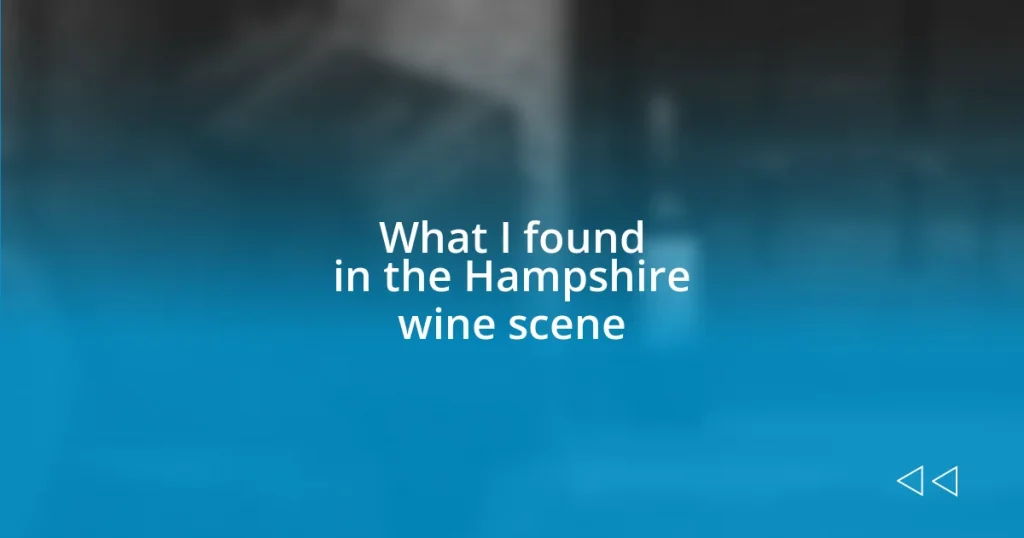Key takeaways:
- The UK is emerging as a notable wine-producing country, with regions like Sussex, Kent, Hampshire, and Cornwall creating high-quality wines, particularly sparkling varieties.
- Wales and Scotland are showcasing unique wine offerings, with Welsh vineyards exploring hybrid grape varieties and Scottish producers innovating with sustainable practices and unusual wine methods.
- Visiting UK vineyards is enhanced by preparation—booking tours in advance, engaging with staff for recommendations, and asking questions to discover the stories behind the wines.
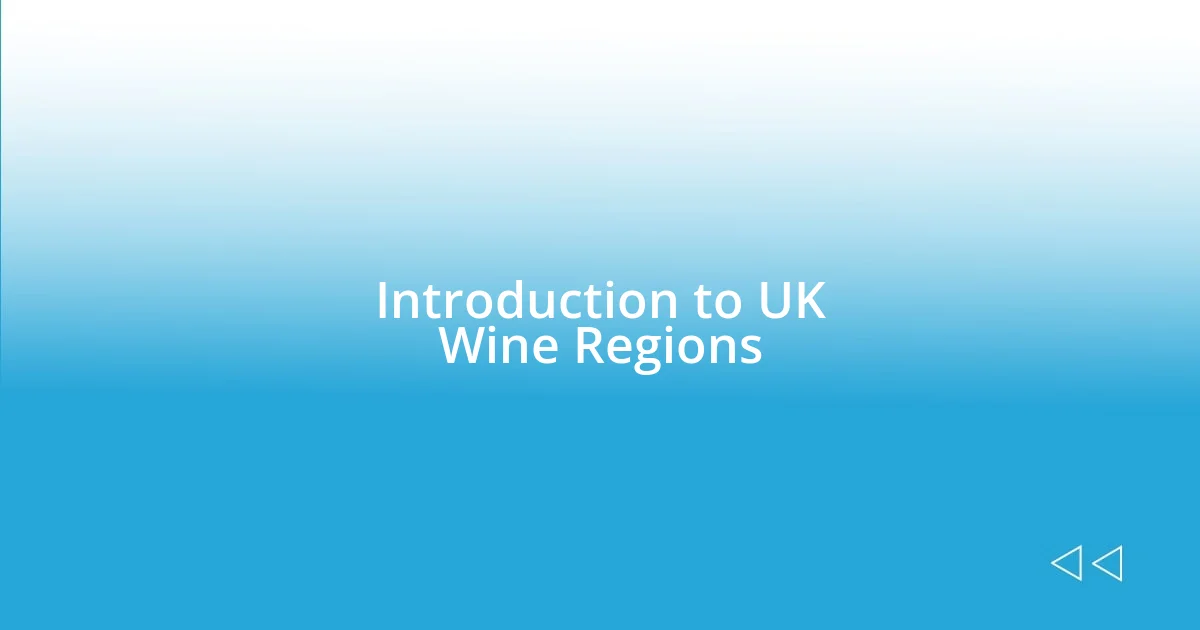
Introduction to UK Wine Regions
When I think about UK wine regions, a smile washes over me as I recall my first vineyard tour in Sussex. It was unexpected; I never imagined our country could produce such exquisite wines. The rolling hills, lush vineyards, and friendly winemakers quickly captured my heart. Isn’t it fascinating how wine can connect us to a place and its people?
The UK may not be the first country that springs to mind when you think of wine, but the growth in this industry is remarkable. Regions like Kent and Cornwall are making waves in the wine world, creating stunning sparkling wines that rival those from Champagne. Each glass seems to tell a story, inviting you to savor the unique terroir (a French term for the land’s environmental factors) that shapes the grapes. Have you ever noticed how a sip of wine can transport you to the very soil it comes from?
As I explore more of these regions, I often find myself reflecting on how local climate changes have allowed vineyards to thrive—even in cooler temperatures. The phenomena of climate change have granted UK winemakers a surprising edge, leading to intriguing varietals that continue to evolve. Isn’t it exciting to think about what explosive growth lies ahead?

Exploring England’s Wine Country
Exploring England’s wine country reveals a treasure trove of hidden gems. I vividly remember my visit to the vineyards in Hampshire, where the owners warmly welcomed me for a tasting. Each sip unveiled vibrant notes of green apple and pear, reflecting the region’s unique climate. I often think about how each bottle crafted there whispers tales of local history and passion.
In Sussex, the landscape enchants me—picturesque hills dotted with vines as far as the eye can see. During one particularly sunny afternoon, I strolled through the vineyards, feeling the sun’s warmth soak into my skin. It’s amazing how a simple glass of English sparkling wine can elevate any moment, isn’t it? I can’t help but feel a deep appreciation for the dedication of those who work tirelessly to produce something so remarkable in a place one might least expect.
Kent boasts a rich wine-making history that dates back to Roman times, a fact that never ceases to amaze me. When I first learned of this, it felt like unraveling a fascinating story woven into the very fabric of the countryside. Arts and crafts fairs in nearby towns often celebrate local wines, making it a delightful experience to taste and learn. Have you ever had the chance to immerse yourself in a community that brings wine to the forefront of local culture?
| Region | Notable Wines |
|---|---|
| Sussex | Sparkling wines, Chardonnay |
| Kent | Pinot Noir, Sparkling wines |
| Hampshire | White wines, Rosé |
| Cornwall | Red wines, Sparkling wines |

Wales’ Unique Wine Offerings
Wales is a true delight for wine enthusiasts looking for something a bit different. I remember my first visit to the Wye Valley, where the landscape seemed almost mystical with its lush greenery, creating an enchanting backdrop for vineyards. I was captivated by the local wineries that boldly embrace hybrid grape varieties, showcasing a creative flair that’s distinctly Welsh. The wines produced here, like the light and floral White Castle Pinot Noir, offer a refreshing twist, making every sip feel like a new adventure.
Some highlights of Wales’ unique wine offerings include:
– Grape Varieties: A focus on unique hybrids like Solaris and Phoenix that thrive in the local climate.
– Geographical Diversity: From the coastal vineyards of Pembrokeshire to the rolling hills of Monmouthshire, each area boasts its own microclimate.
– Distinctive Wine Styles: Innovative production methods leading to dynamic wines, including fruity whites and robust reds that often surprise newcomers.
– Sustainability Practices: Many Welsh vineyards prioritize organic and sustainable farming, reflecting a commitment to the environment.
– Local Pairings: Traditional Welsh dishes, such as lamb or seafood, paired with local wines for an authentic experience.
Experiencing a tasting at Trevibban Mill felt like being part of a vibrant community celebration. I still remember the warmth of the sun and the laughter echoing through the vineyard. The friendly winemaker shared stories about their journey into wine, highlighting the challenges and joys along the way. It struck me how you could taste their passion in every glass, turning each visit into a personal connection with this beautiful region.
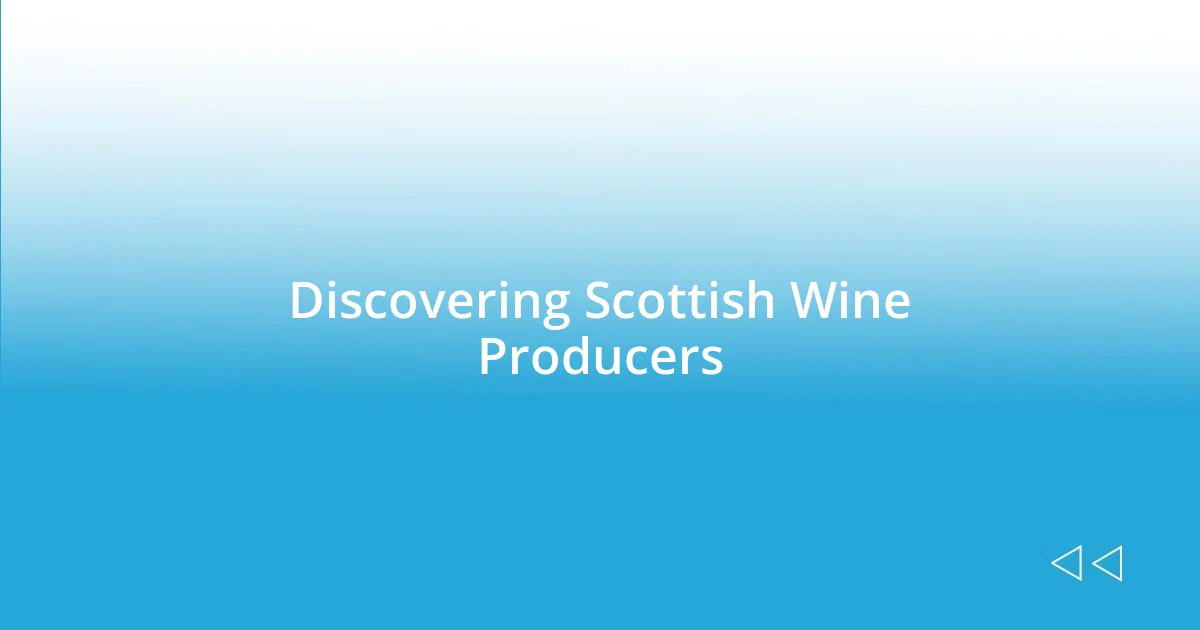
Discovering Scottish Wine Producers
Scottish wine producers are carving out a niche in a landscape often overshadowed by their counterparts in England. On my first visit to a vineyard on the banks of Loch Lomond, I was taken aback by the beauty of the setting—the mist rolling over the hills, the sparkling water, and the rows of vines flourishing in such a unique environment. It made me wonder, can wine really tell a story about a place? Absolutely—it was in those sweet, aromatic wines that I tasted the essence of Scotland.
As I explored the vineyards near Perth, I was introduced to some surprisingly delightful varietals, like the Pinot Noir and Bacchus. The winemakers here are such passionate storytellers. I recall sitting down with one producer who shared the ups and downs of growing grapes in the unpredictable Scottish climate. He vividly depicted how each season shaped the flavor profiles of the wines—a beautiful blend of craftsmanship and nature’s unpredictability.
The importance of innovation among Scottish wine producers truly excited me. While many might expect traditional methods, these wineries are experimenting with techniques like sustainable practices and even ice wine production! Have you ever tasted a wine that was made using an unorthodox method? It’s a revelation. When I had the opportunity to sample a Highland sparkling wine, I was astonished by its crispness and depth. It made me realize just how much potential exists in the Scottish wine scene, waiting to be discovered by eager palates.

Tips for Visiting UK Vineyards
Visiting UK vineyards can be a delightful experience, but a little preparation goes a long way. One tip that I find invaluable is to check for guided tours or tastings before you arrive. On one occasion, I visited a vineyard in Sussex without booking ahead and missed out on a fascinating tour of their winemaking process. The guide shared insights that truly enriched my understanding of the craft behind the bottle. I’ve learned my lesson – always check the schedule!
Another helpful tip is to take the time to engage with the staff. I remember chatting with a friendly server at a small vineyard in Kent who passionately described the nuances of their harvest. This interaction not only deepened my appreciation for their work but also led to discovering a delightful wine that wasn’t initially on my radar. Have you ever tried a wine recommended by someone who truly loves what they do? Those personal touches can create memorable tasting moments.
Finally, don’t shy away from asking questions during your visit. I once asked a winemaker about their favorite food pairings, and to my surprise, this sparked an incredible conversation about their heritage and influences. I realized that each vineyard has its own story woven into their wines, and those narratives can add so much depth to your tasting experience. Embracing curiosity during your visits can turn a simple tasting into a journey through their world of wine.

